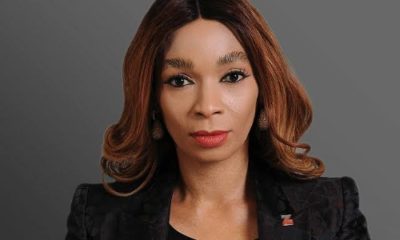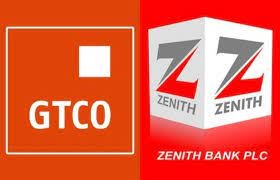Finance
Fitch: Nigerian banks performing well despite hurdles

Fitch Ratings says in a new special report that Nigerian banks are performing well despite the twin hurdles of tight monetary policy actions and new banking rules.”This is mostly supported by continuing robust economic growth. Nevertheless, we expect bank performance and growth to moderate over the next 18 months due to Central Bank of Nigeria actions aimed at protecting the economy and the banking system,” says Mahin Dissanayake, Director in Fitch’s EMEA Financial Institutions team.
The CBN’s stance also shifted towards protecting the consumer through its revised rules on banking charges introduced in 2013. All these moves, however, led to weaker profitability and stemmed credit growth in H114 – a trend that is likely to continue into 2015.
All Fitch-rated Nigerian banks were profitable in 2013 and 1H14 but saw performance slip. There were a few outliers and these were typically the smaller banks, which outperformed the sector.
Earnings pressure was exacerbated by high operating costs at most banks due to a higher AMCON levy and network expansion st rategies.
rategies.
Banks are now seeing some asset quality deterioration with rising absolute NPLs, reflecting fast loan growth since 2011. Most banks’ NPL ratios remain below the 5% prescribed by the CBN but Fitch views this as unsustainable in the long-run. Very high loan concentrations by borrower and sector expose banks, particularly the smaller banks, to significant event risk.
Banks are also seeing moderate liquidity pressure with rising loans/deposit ratios. In response, the banks’ large customer deposit bases are continuing to expand on strong GDP growth and increasing banking penetration. The focus is on raising low-cost retail deposits to strengthen funding profiles, particularly following the cash reserve requirement hikes on public sector deposits. Several banks have successfully tapped the euro bond market to raise longer-term USD funding to meet the strong demand for USD loans from major corporates, although it exposes the banks to FX-related risks.
We expect bank capitalisation to come under pressure due to Basel II implementation in 2014 and proposed new regulatory capital computation rules. As a result, Fitch believes regulatory total capital adequacy ratios could fall between 200bps-300bps this year. Most Fitch-rated banks report Fitch core capital (FCC) and Basel I regulatory capital ratios in excess of 20% which is considered a comfortable level given the risks inherent in Nigeria. A sharp decline in capitalisation could be negative for bank ratings.
Sovereign support drives most Nigerian banks’ Issuer Default Ratings. Of the 9 Nigerian banks rated by Fitch on the international scale, six have Long-Term IDRs driven by potential state support. They are First Bank of Nigeria, United Bank for Africa, Diamond Bank, Union Bank, Fidelity Bank and First City Monument Bank. While the willingness of the Nigerian authorities to support domestic banks continues to be high – as demonstrated during and after the 2009 banking crisis – its ability is limited by the sovereign rating of ‘BB-‘.
Three banks, Zenith Bank, Guaranty Trust bank and Access Bank have IDRs driven by their intrinsic strengths as defined by the Viability Rating (VR). All Nigerian banks have VRs in the ‘b’ range, mainly due to the high influence of the operating environment on their ratings. We believe the domestic operating environment can be challenging and sometimes volatile, therefore effectively capping the Nigerian banks’ VRs. Other factors constraining VRs include weak governance structures, developing company profiles (particularly for the smaller banks) and recovering financial metrics. Zenith Bank and Guaranty Trust Bank have the highest VRs of ‘b+’ due to their ability to perform well through the cycle.
Business
Nigeria pays US$4.9 billion on petrol subsidy in 2024- NNPCL
It was however noted by Biztellers.com.ng, that although subsidy is back in effect, the main reason for that is the increasingly weak state of the Naira and the country’s extreme dependence on products importation. Also unlike the previous subsidy era, where several oil marketers were getting free subsidy refunds for unverified product importation, this subsidy era is witnessing only one importer, the NNPCL, which in effect is the sole receiver of government subsidies.
Yemie ADEOYE
INSPITE of the official position of the Nigerian government that the controversial petrol subsidy is gone for good as announced by the President on assumption of office, the state owned Nigerian National Petroleum Corporation Limited, NNPCL has disclosed that petrol subsidy is still fully operational in Nigeria, although, under a different identity.
Umar Ajiya, Chief Financial Officer at the NNPCL, disclosed that it cost the company a staggering N7.8 trillion (US$4.9) to cover this price gap in the first seven months of 2024.
Rather than simply referring to these claims as subsidies, he stated that the company is merely managing the price difference in petrol imports on behalf of the federation, stressing that this should not be misconstrued as a return to subsidy payments.
![]() This revelation has reignited discussions on whether the NNPC is indirectly offering subsidies, a concept typically defined as selling a product below its cost price.
This revelation has reignited discussions on whether the NNPC is indirectly offering subsidies, a concept typically defined as selling a product below its cost price.
Documents reviewed by Biztellers.com.ng showed that the term “subsidy” was used extensively in official correspondence between the NNPCL and the presidency, particularly in reference to the “shortfall.”
Recall that President Bola Tinubu reportedly approved NNPC’s request to utilize the 2023 final dividends due to the federation to offset these costs.
However, during a media briefing on Monday about the company’s 2023 audited financial statements, Ajiya refuted claims that the NNPC is involved in any subsidy scheme.
Ajiya further disclosed that the Nigerian government owes the NNPC N7.8 trillion ($4.9 billion) in subsidy-related debts for the period from January to July 2024.
In furtherance of his clarification to the News Agency of Nigeria (NAN), Ajiya insisted that no subsidy payments have been made to any marketer in the last nine years, citing the NNPC’s role as the sole importer of petrol under supply contracts.
He said, “In the last eight to nine years, NNPC Ltd. has not paid anyone a dime as a subsidy; no kobo has been disbursed by NNPC Ltd. in the name of subsidy. No marketer has received any payment from us for subsidy.”
“What has been happening is that we have been importing PMS, which has been landing at a specific cost price, and the government tells us to sell it at half price. So the difference between the landing price and that half price is a shortfall.
“And the deal is between the Federation and NNPC Ltd., to reconcile, sometimes they give us money, so there is no money exchanging hands with any marketer in the name of subsidy.”
Ajiya remained silent on how much of the $4.9 billion could have been remitted to the federation account if the NNPC had not been covering the “shortfall.”
It was however noted by Biztellers.com.ng, that although subsidy is back in effect, the main reason for that is the increasingly weak state of the Naira and the country’s extreme dependence on products importation. Also unlike the previous subsidy era, where several oil marketers were getting free subsidy refunds for unverified product importation, this subsidy era is witnessing only one importer, the NNPCL, which in effect is the sole receiver of government subsidies.
Banking
CBN Denies Currency Devaluation

The Central Bank of Nigeria (CBN) has refuted claims of devaluing the.
Earlier reports suggested that the CBN had devalued the Naira, lowering its exchange rate from N631 to the dollar, compared to the previous day’s rate of N461.60 at the Importers and Exporters (I&E) window.
However, the Central Bank of Nigeria (CBN) released a statement on Thursday through its Acting Head of Corporate Communications, Dr. Isa Abdulmumin, categorizing the report as false information.
In the statement titled ‘CBN Has Not Devalued The Naira’, he said the attention of the apex bank was drawn to the news report by an Abuja based newspaper edition of June 1, 2023, titled “CB Devalues Naira To 630/51”.
However, the CBN stated categorically that the news report was replete with outright FALSEHOODS and destabilizing innuendos, ‘reflecting potentially willful ignorance of the said medium as to the workings of the Nigerian Foreign Exchange Market.’
“For the avoidance of doubt, the exchange rate at the Investors’ & Exporters (I&E) window traded this morning (June 1, 2023) at N465/USS1 and has been stable around this rate for a while.
“The public is hereby advised to ignore the news report by Daily Trust in its entirety, as it is speculative and calculated at causing panic in the market,” the CBN spokesman added.
He, therefore, advised media practitioners to verify their facts from the Central Bank of Nigeria before publishing in order not to misinform the public.
Banking
BREAKING: CBN Increases Interest Rate By 0.5%

The interest rate in Nigeria has been raised to 18.5 percent, up by 0.5 percent, from 18 percent where it was pegged in March 2023.
The Central Banks of Nigeria’s (CBN) Monetary Policy Committee (MPC) resolved to this effect at its third meeting of 2023 in Abuja, on Wednesday.
Governor, CBN, Godwin Emefiele, made the disclosure in the communiqué of the MPC’s meeting, thereafter.
While engaging the media at the end of the two-day meeting, Emefiele, said the committee voted to keep the asymmetric corridor at +100 and -700 basis points around the MPR.
In the view of the MPC, rising inflation rate is traceable to the high energy cost and challenges around the supply chain, among others, which lie outside the corridors of the CBN.
Emefiele said, “The current trend in price development would continue to be monitored by the bank with greater collaboration with fiscal authority to address the drivers of inflation.”
Biztellers reports that the CBN had effected six consecutive interest rate increases, which has seen the rate move from 11.5 percent in March 2022 to 18.5 percent in May 2023.




















